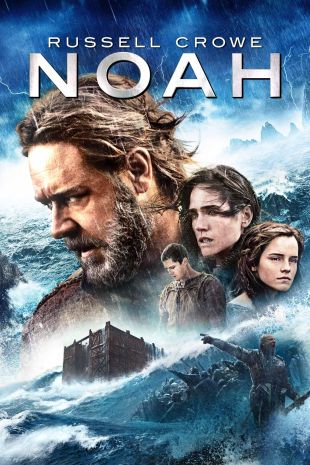
Fundamentalist Christians take heed, Darren Aronofsky's Noah is not the story you learned in Sunday school. On the contrary, this vital interpretation of one of the Bible's most popular tales is a powerful and provocative work of art that fearlessly uses Noah's story as a springboard to explore complex themes of faith and the sins of man rather than another excuse to simply walk us through the motions once more. For anyone who's ever seen an Aronofsky film, of course, that will hardly be a revelation; for others buying a ticket seeking reinforcement of their beliefs, these waters will prove especially rough.
"In the beginning, there was nothing." So starts this version of the story centered on Noah (Russell Crowe), the man entrusted by God to save the innocent animals of Earth as the rising floodwaters cleansed the planet of mankind's evil. As the telling continues, we learn how Adam and Eve's sins have passed down through generations through their sons Cain and Abel, and how the descendants of their righteous sibling Seth were entrusted with defending creation. One day, while foraging in the country, a descendant of Seth, Noah, sees his father slain by a descendant of Cain. In the process, Noah's birthright is stolen from him.

Decades later, as a father of three, Noah experiences a vision foretelling the great flood that will wash over the Earth, destroying every living thing that stands on the soil. That vision leads Noah to seek out his grandfather, Methuselah, in order to understand his mission. When a second vision reveals that Noah is to construct a massive ark designed to shelter every living animal during the great flood, Noah, his wife Naameh (Jennifer Connelly), their three sons Shem (Douglas Booth), Ham (Logan Lerman), and Japheth (Leo McHugh Carroll), and their adopted sister Ila (Emma Watson) immediately begin construction on the vessel with the help of the Watchers, a race of angels created as beings of light, but encrusted in stone and mud and forsaken by God for their attempts to help man. Meanwhile, word of Noah's work soon reaches Tubal Cain (Ray Winstone), who gathers an army on a mission to overtake the ark, and survive the coming storm by any cost.
Although it would be possible to go on at least another two paragraphs to discuss precisely what happens once the floodwaters rise and the ark sets sail, those details are best left to be discovered by those who choose to step aboard for this thrilling and thought-provoking ride, because therein lies the core of the themes that give this story such vivid life. Regardless of your personal belief system, screenwriters Aronofsky and Ari Handel make the aforementioned concepts of faith and sin not just urgent but relevant. Even today fanatics kill in the name of religion while as a culture we amass mountains of trash while raping the land for oil that spills into the ocean and pollutes the sky. This Noah questions whether our species, with our endless obsession with comfort and convenience, is actually a blight upon the land, rather than a blessing. Aronofsky and Handel's screenplay explores these ideas within the framework of a sound structure that, much like the ark itself, is well capable of maintaining its integrity. Their vision of Noah's tale is uncompromising, and at times deeply frightening (in the beginning we root for Noah to succeed, and in the end we fear his gaze for the terrifying figure he has become).

Crowe instills this vision of Noah with an unrelenting honesty that draws us to the character, even as we shrink away from him onscreen. Righteous, fearless, and willing to do the unthinkable in order to honor God's plan, he can also be a compassionate figure and a caring father, and Crowe plays each of these emotions with total conviction. As his wife Naameh, Connelly is sent through an emotional wringer that would consume a lesser actress, delivering one of the film's most powerful, impassioned speeches with love in her heart but fire in her eyes. Among their offspring the performances are solid all around, but it's Lerman as Ham, torn between loyalty to his father and Tubal Cain, who's entrusted with baring most of the secondary story's dramatic weight, and anyone who saw him in The Perks of Being a Wallflower knows well that he's up to such a challenge. Even when faced with the thankless task of appearing opposite Winstone, whose imperial bluster here flirts dangerously with camp while highlighting the exact reason all of this is happening, Lerman gives Ham's torment genuine substance. As the mystical, berry-obsessed Methuselah, Anthony Hopkins instills Noah with its closest approximation to levity, while Nick Nolte's weatherworn voice provides the perfect inflection for the stony, tortured Watcher Sanyaza.
Then, of course, there's the visual approach of Aronofsky's film. A director with an eye for detail, he works with loyal cinematographer Matthew Libatique to give Noah an otherworldly atmosphere in which stars sparkle in sunlit skies, and strange creatures walk the land. Despite taking place on Earth, the opening scenes of Noah appear to occur on an alien planet, mesmerizing us early on, reinforcing the film's ethereal feel and leaving us breathless by the time we witness the story of Genesis near the end of the film. Even then, there are more themes to be explored -- of forgiveness and the perception of failure -- but by that point one line of dialogue will likely be echoing in your ears and challenging your perception: "Maybe we can learn to be kind." Even if we take nothing else away from Aronofsky's Noah, that one hopeful sentiment is worth pondering now as much as ever before.
